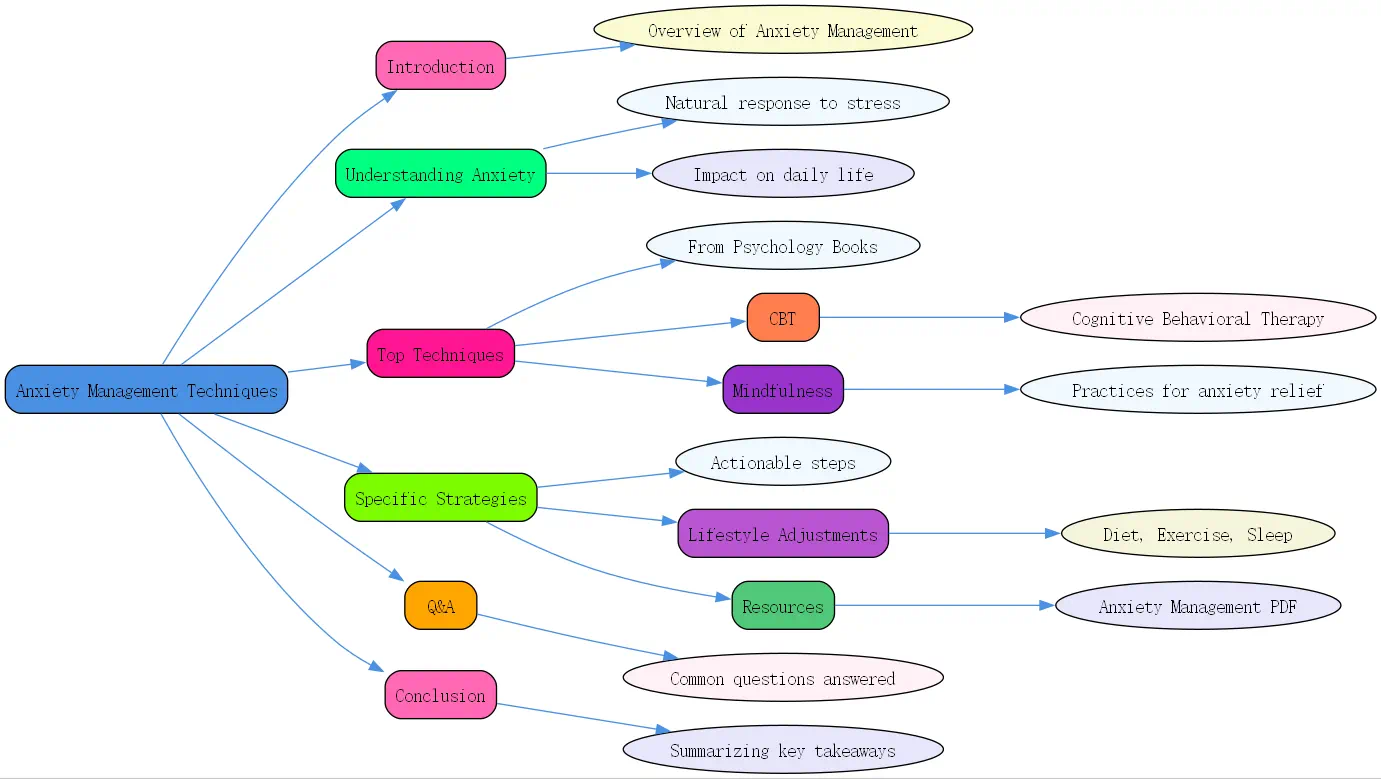Anxiety Management Techniques: A Comprehensive Guide

Anxiety is a natural response to stress, but when it becomes overwhelming or chronic, it can significantly impact daily life. Understanding how to manage anxiety effectively is crucial for maintaining mental well-being. In this guide, we’ll explore various anxiety management techniques, including cognitive behavioral therapy (CBT), mindfulness practices, and lifestyle adjustments. Whether you’re looking for an anxiety management course or downloadable resources like an anxiety management techniques PDF, this article has you covered. Let’s dive in!
Understanding Anxiety and Its Impact
Anxiety disorders are among the most common mental health challenges worldwide. They manifest in various forms, such as generalized anxiety disorder (GAD), panic attacks, phobias, and obsessive-compulsive disorder (OCD). These conditions can disrupt sleep, impair focus, and strain relationships. Fortunately, effective anxiety management techniques exist to help individuals regain control. By addressing both the psychological and physiological aspects of anxiety, these methods empower people to lead healthier, more balanced lives.
The importance of managing anxiety cannot be overstated. Chronic anxiety not only affects mental health but also contributes to physical ailments like hypertension and weakened immunity. This is where structured approaches—such as those offered by BrainTalking—come into play. Their expertise ensures that individuals receive evidence-based strategies tailored to their needs.
Top Anxiety Management Techniques from Psychology Books
When it comes to managing anxiety, psychology books offer invaluable insights. Below, we’ll explore some of the most effective techniques recommended by experts in the field.
Cognitive Behavioral Therapy (CBT) Techniques:
CBT is widely regarded as one of the most effective treatments for anxiety. It focuses on identifying and challenging negative thought patterns that fuel anxious feelings. For instance, The Worry Trick by David A. Carbonell addresses catastrophic thinking—a common issue among those with anxiety. The book teaches readers how to recognize irrational fears and replace them with realistic perspectives.
Another excellent resource is Detox Your Thoughts by Andrea Bonior, which provides practical tools for overcoming negative thought cycles. Similarly, The Anxiety and Worry Workbook by David A. Clark and Aaron T. Beck offers cognitive-behavioral solutions to manage worry effectively. These techniques are especially useful for individuals seeking structured guidance through an anxiety management course.
Mindfulness and Stress Reduction:
Mindfulness has gained significant attention for its role in reducing stress and anxiety. Books like Declutter Your Mind by SJ Scott and Barry Davenport emphasize organizing thoughts through mindfulness-based practices. By focusing on the present moment, individuals can reduce overthinking and emotional reactivity.
For those dealing with panic attacks, Mindfulness Workbook for Panic Attacks by Tanya J. Peterson provides step-by-step exercises to calm the mind during episodes. Additionally, Full Catastrophe Living by Jon Kabat-Zinn introduces mindfulness meditation as a powerful tool for long-term stress reduction. These resources align perfectly with the growing demand for accessible anxiety management techniques PDFs.
Lifestyle Adjustments for Anxiety Relief:
Sometimes, small changes in daily habits can make a big difference. The Anti-Anxiety Food Solution by Trudy Scott explores the connection between diet and anxiety, offering actionable tips to improve mental health through nutrition. Consuming nutrient-rich foods and avoiding stimulants like caffeine can stabilize mood and energy levels.
Another notable book is The Stress-Proof Brain by Melanie Greenberg, which outlines practical techniques to build resilience against stress. From breathing exercises to time management strategies, these methods equip individuals to handle life’s challenges more effectively.
Specific Anxiety Management Strategies and Resources
While general techniques are helpful, specific strategies target particular anxiety disorders. Here’s how certain resources address unique needs.
 Techniques for Specific Anxiety Disorders:
Techniques for Specific Anxiety Disorders:
For individuals struggling with OCD, Getting Over OCD by Jonathan S. Abramowitz offers a workbook-style approach to overcoming compulsive behaviors. Meanwhile, The Anxiety and Phobia Workbook by Edmund J. Bourne provides comprehensive guidance for coping with phobias. Both books incorporate evidence-based practices to ensure lasting results.
Practical Tools and Workbooks:
Workbooks are excellent tools for hands-on learning. The Anxiety Tool Kit by Alas Boys presents practical tools to manage anxiety in everyday situations. Similarly, Panic Attacks Workbook by David Carbonel serves as a guided program for overcoming panic attacks. These resources are ideal companions for anyone enrolled in an anxiety management course.
Additional Resources:
Looking for downloadable materials? Many websites offer free anxiety management techniques PDFs, providing quick access to valuable information. Additionally, online platforms like BrainTalking host structured courses designed to teach management anxiety disorder skills systematically.
For a lighter yet impactful approach, Hardcore Self-Help FK Anxiety by Robert Duff uses humor and straightforward language to demystify anxiety. This book resonates with readers who prefer relatable, no-nonsense advice.
Actionable Steps for Managing Anxiety
- Practice deep breathing exercises daily to reduce immediate symptoms.
- Challenge negative thoughts using CBT techniques outlined in workbooks.
- Incorporate mindfulness meditation into your routine for long-term benefits.
- Explore dietary changes suggested in The Anti-Anxiety Food Solution.
- Download an anxiety management techniques PDF for quick reference.
Q&A Section
What Are the Best Ways to Start an Anxiety Management Course?
Starting an anxiety management course requires preparation and commitment. Begin by assessing your specific needs—are you dealing with generalized anxiety, panic attacks, or another condition? Next, choose a reputable provider like BrainTalking, known for its expertise in mental health education. Look for courses that combine theoretical knowledge with practical exercises, such as mindfulness activities or CBT worksheets. Finally, set aside dedicated time each week to engage fully with the material. Consistency is key to achieving meaningful progress.





